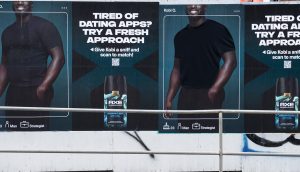The Toronto International Film Festival (TIFF) will return for its 42nd year this week, which means a flood of films accompanied by activations from brands. While some like Bell and Visa will activate through official sponsorships, others are aiming to capture attention without signing with TIFF.
Audi served as the official auto sponsor of the festival from 2012 to 2014 before Ford grabbed this position, but it still programs around the festival. This year, the automaker will sponsor a series of private galas after big-name film screenings such as the George Clooney/Coen Brothers project Suburbicon, period drama Hostiles (starring Christian Bale and Rosamund Pike), the romance film Kings (starring Halle Berry and Daniel Craig) and The Disaster Artist, James Franco’s star-studded comedy based on the making of The Room.
Because there is no official sponsorship, there is no TIFF branding on the parties or the brand’s marketing material for them.
Audi declined to comment on this element of its strategy, but this method of promotion around TIFF time is far from uncommon. Other advertisers activating around the festival include Swarovski and makeup line Annabelle, both of which will be featured in the NKPR It Lounge.
The It Lounge has hosted galas, gifting lounges and industry panels independently of the festival since it was established in 2006 (save for 2015, when it became an official sponsor to mark its own 10-year anniversary).
Tony Chapman, founder and CEO of Tony Chapman Creations and the former CEO of Capital C, told MiC he thinks the strategy of such “ambush-style” marketing around TIFF is a smart one.
“Every year TIFF gets bigger, attracting more celebrities, attracting more media, and they’re able to raise their sponsorship prices,” said Chapman. “Their success feeds their success, and suddenly you have a lot of brands that want to be a part of it and can’t afford it.”
Acting as a direct sponsor of TIFF may not always drive the exact results a brand is looking for, he adds. “The TIFF sell is a pretty hard sell,” he said. “For one thing, it’s a limited schedule for exposure. It’s only one week. And even though it has international exposure, it’s ultimately only a Toronto event in terms of physical traffic and sampling. If you’re a Canadian beer guy, how many actual Canadians are you sampling? Maybe you’ll be lucky enough to get that magical shot of George Clooney drinking your beer, but that’s not a guarantee.”
And, he said, the odds of getting that magic shot of a celebrity drinking your beer (or trying on your watch or sampling your diamonds) are just as high for brands activating unofficially.
“In the end, you’re paying to promote your brand as opposed to paying to be a part of something, and you get to have a little more control.”
But Matthew Logue, COO at MKTG Canada, said the official sponsorship should matter to brands — and the impact of continued sponsorship builds more brand credibility.
“As a brand, you want to have an authentic story,” he told MiC. “For brands to try and associate with [the festival] in an overt way without being an official partner, I don’t think that’s sincere.” He said it’s important for brands to support TIFF, rather than simply benefit off of it. According to TIFF’s most recent annual report, 26% of the organization’s operating budget comes from corporate sponsorship.
He admitted that working in the sponsorship industry, he is slightly biased, although MKTG doesn’t work with any official TIFF sponsors. But beyond principles, he thinks that an official brand partnership presents more opportunities to advertisers.
He said it’s also a misconception that there’s not as much freedom, and that many repeat sponsors have integrated differently at the festival year after year. “It’s a lot more than just securing your name on a backdrop,” pointing to Grolsch, which first partnered with TIFF in 2012 and has progressed over the years to sponsor an app and microsite, a People’s Choice award and an OOH activation.
“If you look at what TIFF has done in terms of year-round programming, sponsors have greater opportunities,” he said. “Having the rights to the IP owned by TIFF allows you to take on a whole new thematic.” He used the example of Ford’s 2015 VR activation, which allowed users to “test drive” a stationary Ford Mustang through various movie sets (including The Martian), as one that used the festival setting to create something distinctively film-themed. He said for some brands, not being able to use the TIFF branding can be limiting as it doesn’t help build a strong connection in fans’ eyes.
He said that there will be variance in how much consumers can tell the difference between official and unofficial partners, but based on MKTG’s work with brands that sponsor other events, multiple-year sponsorships have generally led to positive brand recall, opinion and likelihood of trialing product.
“There is an impact of being a sponsor time in and time out, and it’s about creating brand awareness.”



















